 Last updated: August 7th, 2024
Last updated: August 7th, 2024
Common Dishwasher Problems And Maintenance Tips
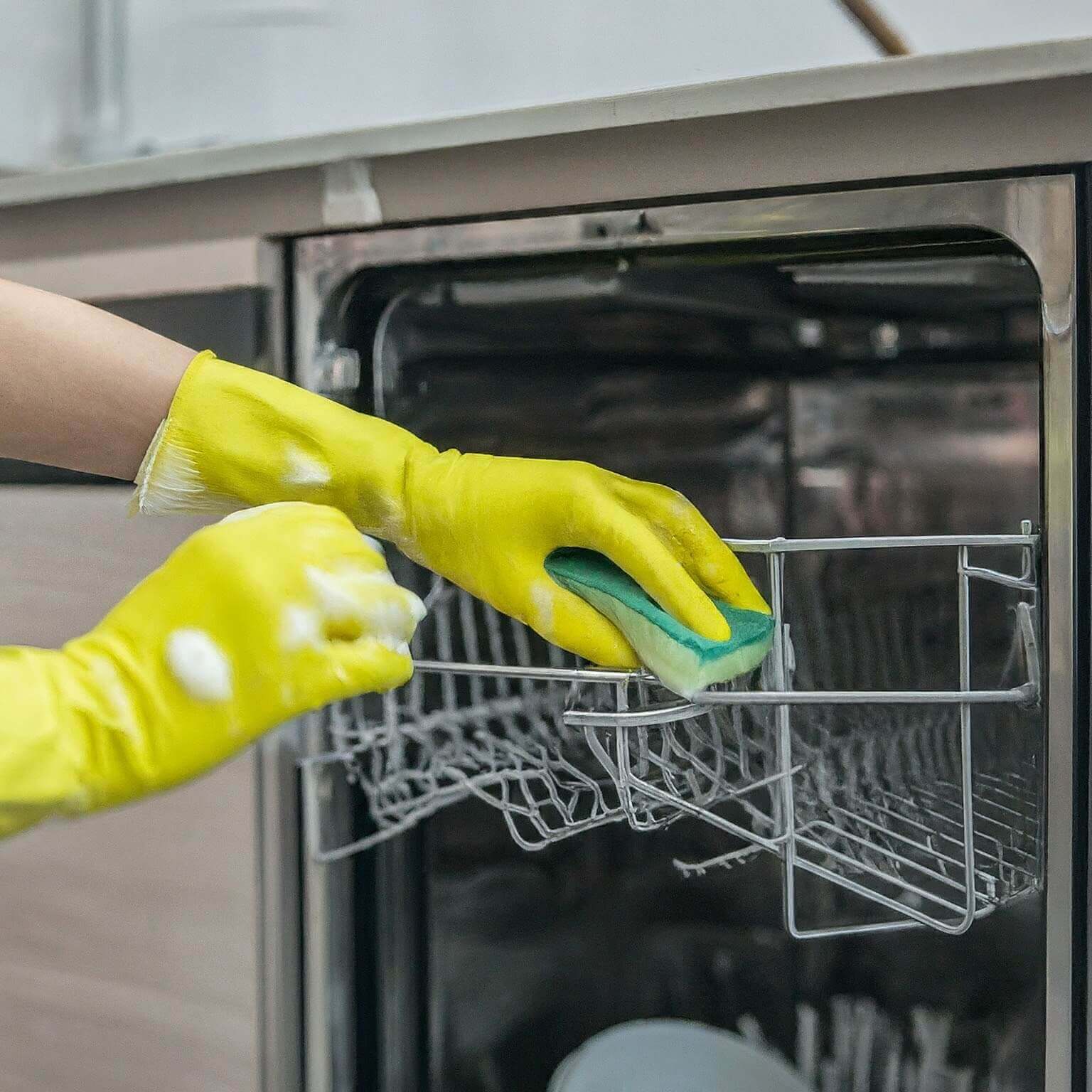
Dishwashers are a modern marvel, freeing us from the drudgery of handwashing dishes. But even these valiant warriors can succumb to occasional battles. Here’s a breakdown of common dishwasher woes and expert tips to keep your appliance running smoothly.
Common Dishwasher Problems And Troubleshooting Tips
Dishwashers are complex appliances; like any machine, they can encounter various malfunctions. Here’s a comprehensive look at common dishwasher problems, their technical causes, and potential solutions:
1. Clogged Spray Arms
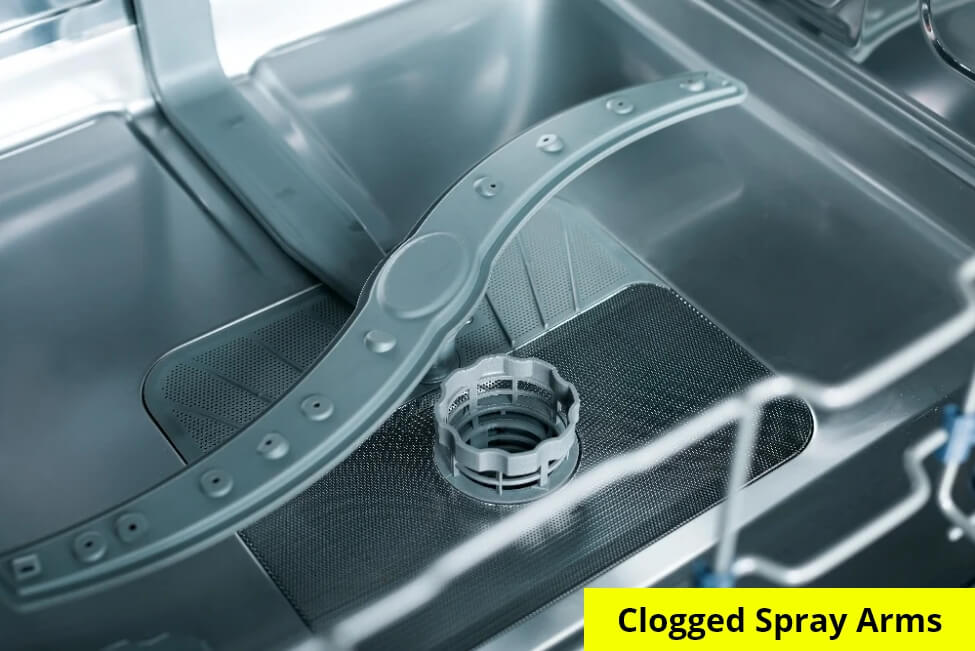
- Cause: Food particles, mineral deposits (hard water), or even small objects like bottle caps can lodge in the tiny holes of the spray arms, hindering water flow and distribution.
- Impact: Reduced water pressure reaching dishes translates to inadequate cleaning and potentially deleting food particles.
- Solution: Regularly remove and inspect the spray arms for clogs. Some models have removable spray arm caps for easier cleaning. Soak the spray arms in warm, soapy water if necessary.
- Troubleshooting Tips:
- Regular Inspection: Regularly remove and inspect the spray arms for clogs. Some models have removable spray arm caps for easier cleaning.
- Deep Cleaning: Soak the spray arms in warm, soapy water to loosen stubborn debris. You can also gently clean the tiny holes with a soft brush or toothpick.
- Water Pressure Check: Ensure your home’s water pressure meets the manufacturer’s recommended level (usually around 40-60 psi) for optimal spray arm performance. A pressure gauge can help you check this.
2. Dirty Filter
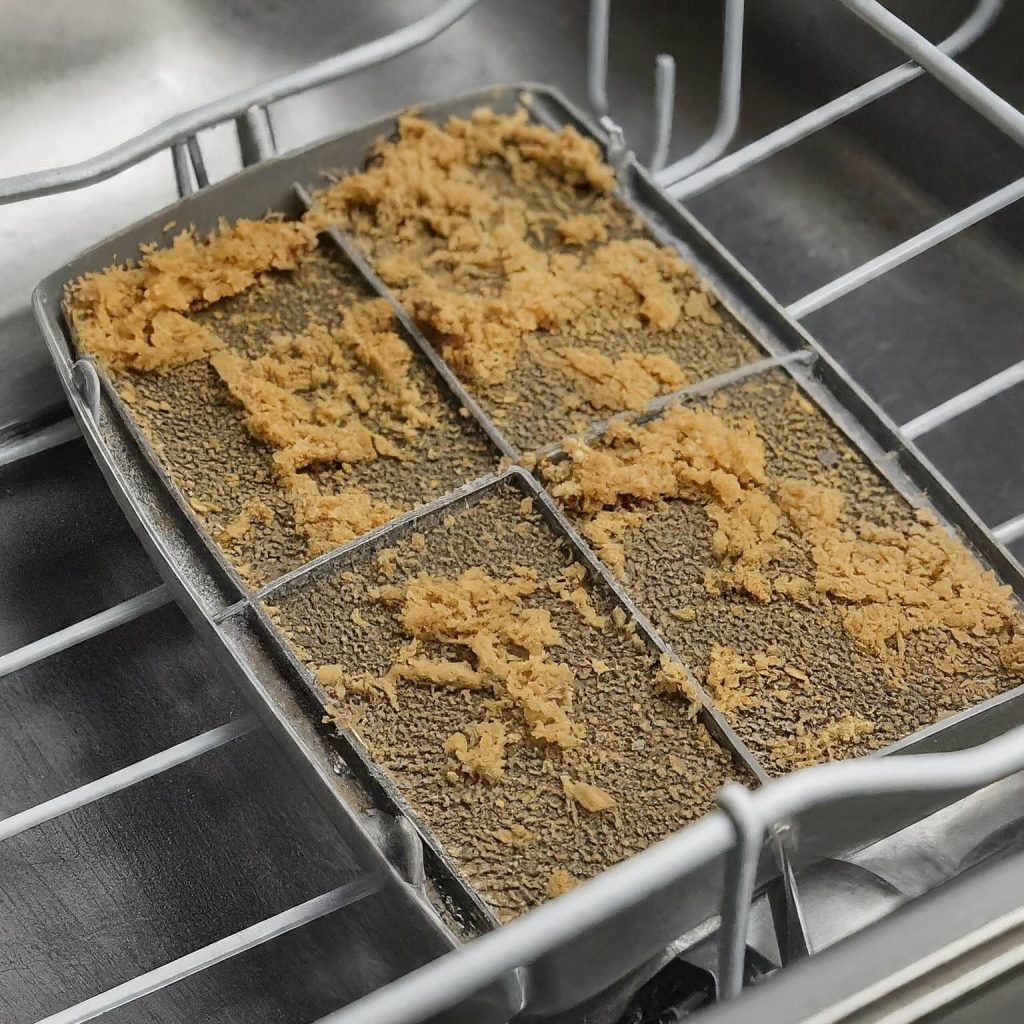
- Cause: The dishwasher filter traps food scraps and debris to prevent them from recirculating through the wash cycle. Over time, the filter can become clogged, hindering water circulation.
- Impact: Clogged filters restrict water flow, reducing the cleaning power of the spray arms and potentially leading to the redeposition of food particles on dishes.
- Solution: Clean the dishwasher filter regularly, following the manufacturer’s instructions. This typically involves removing the filter (usually located at the bottom of the dishwasher) and rinsing it under running water.
- Troubleshooting Tips:
-
- Consult the Manual: Refer to your dishwasher for specific filter removal and cleaning instructions. Generally, the filter is located at the bottom of the dishwasher.
- Regular Cleaning: Clean the filter regularly according to the manufacturer’s recommendations. This typically involves rinsing it under running water to remove trapped food scraps and debris.
- Visual Inspection: While cleaning, inspect the filter for signs of wear or damage. A damaged filter might need replacement to ensure proper water flow.
3. Improper Racking
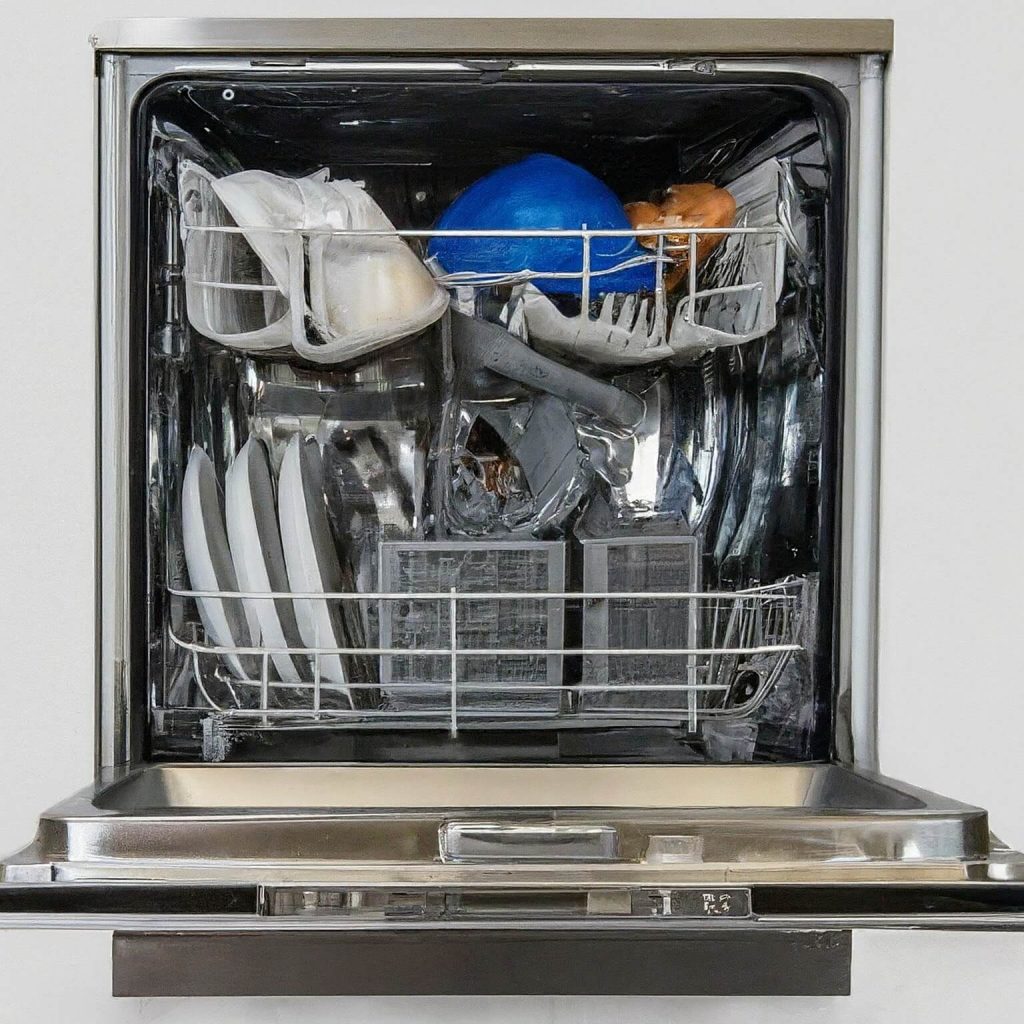
- Cause: Overcrowding the dishwasher or incorrectly placing dishes can block the spray arms, preventing water from reaching all surfaces. Additionally, placing certain items (like long knives) in the wrong positions can hinder the proper rotation of the wash arm.
- Impact: Blocked spray arms result in improper water distribution, which can lead to uneven cleaning and potentially dirty dishes.
- Solution: Consult your dishwasher manual for proper racking techniques. Generally, avoid overloading the dishwasher, ensure dishes don’t block the spray arms, and place items like knives and utensils in designated slots or baskets.
- Troubleshooting Tips:
- Racking Guide: Consult your dishwasher manual for proper racking techniques for your model.
- Strategic Placement: Avoid overloading the dishwasher and ensure dishes don’t obstruct the spray arms. Place tall objects like pots and pans in designated areas that won’t block water flow.
- Utensil Basket Utilization: Utilize the dishwasher’s utensil basket to keep utensils from blocking the spray arms or falling through the racks and potentially clogging the drain.
4. Incorrect Detergent
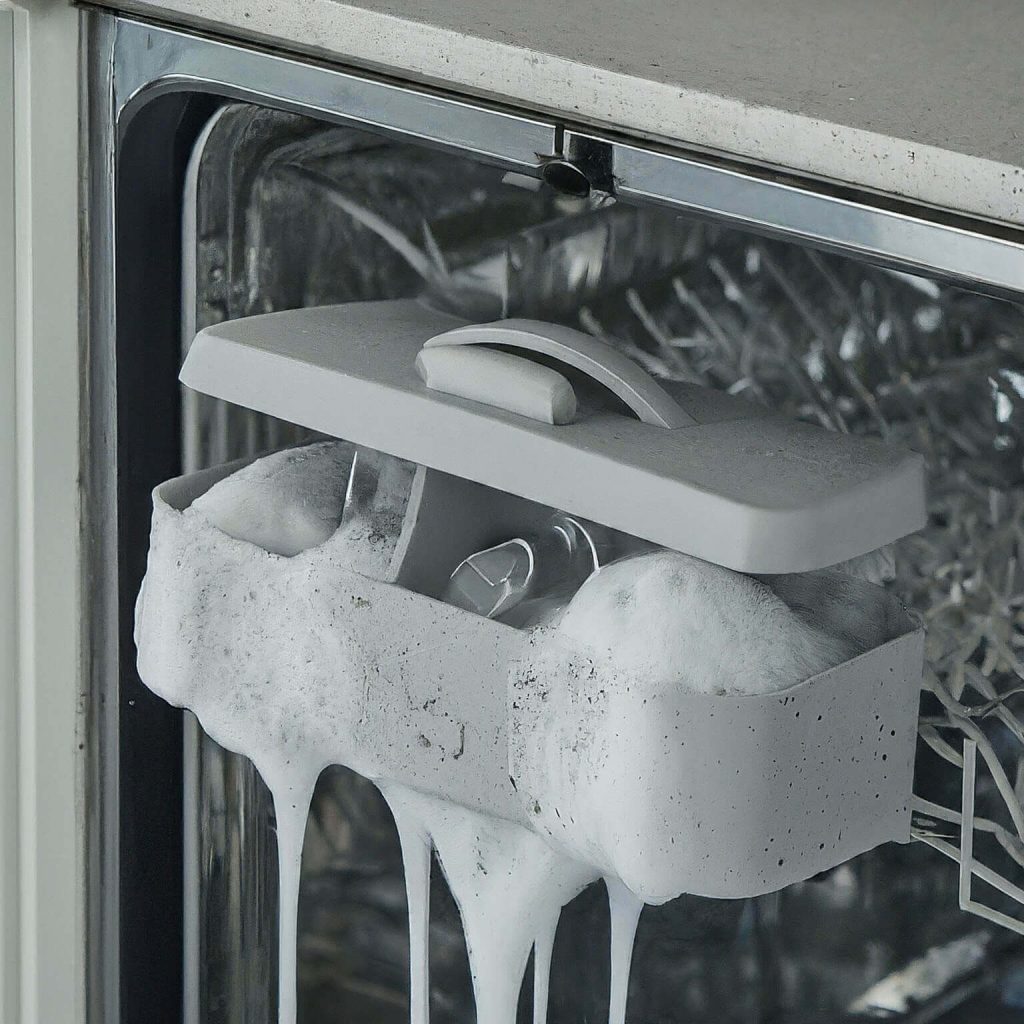
- Cause: Using the wrong type or amount of detergent can negatively impact cleaning performance. Regular dish soap can create excessive lather, and too little detergent might not provide sufficient cleaning power.
- Impact: Excessive lather creation can prevent proper rinsing and leave a film on dishes. Insufficient detergent may not effectively break down grease and food particles.
- Solution: Use high-quality automatic dishwasher detergent (powder, gel, or pacs) formulated explicitly for dishwashers. Follow the recommended dosage instructions on the detergent packaging.
- Troubleshooting Tips:
- Detergent Choice: Use high-quality automatic dishwasher detergent (powder, gel, or PACs) formulated for machine dishwashing.
- Dosage Instructions: Follow the recommended dosage instructions on the detergent packaging to ensure you use the correct amount for your dishwasher load size and water hardness level.
- Water Hardness Test: Consider testing your home’s water hardness. If your water is hard, you might need to adjust the detergent amount or use a rinse aid to prevent hard water spots.
5. Low Water Pressure
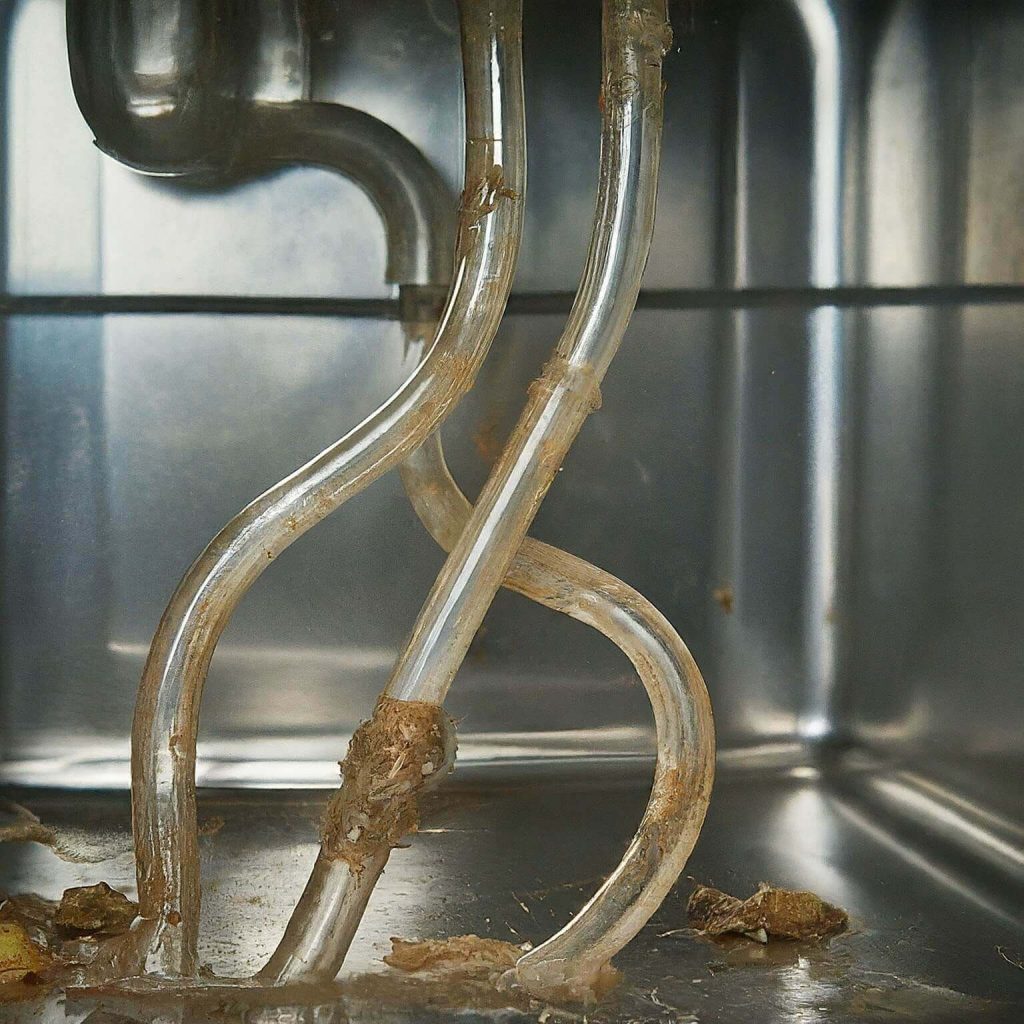
- Cause: Inadequate water pressure from the home’s main supply can prevent the dishwasher from performing a proper cleaning cycle. This could be due to issues with the house’s water pressure regulator, clogged pipes, or a faulty valve within the dishwasher itself.
- Impact: Low water pressure reduces the force of the water spray from the arms, hindering the ability to remove food particles effectively.
- Solution: Check your home’s water pressure using a pressure gauge. If it’s below the manufacturer’s recommended level for your dishwasher (usually around 40-60 psi), consult a licensed plumber to diagnose and address the issue.
- Troubleshooting Tips:
- Pressure Gauge Check: Use a gauge to measure your home’s water pressure.
- Manufacturer Recommendation: Compare the measured pressure to the dishwasher manufacturer’s recommended level (usually around 40-60 psi).
- Plumber Consultation: If the pressure is below the recommended level, consult a licensed plumber to diagnose and address the issue. This could involve problems with the house’s water pressure regulator, clogged pipes, or a faulty valve within the dishwasher itself.
6. Food Spoilage
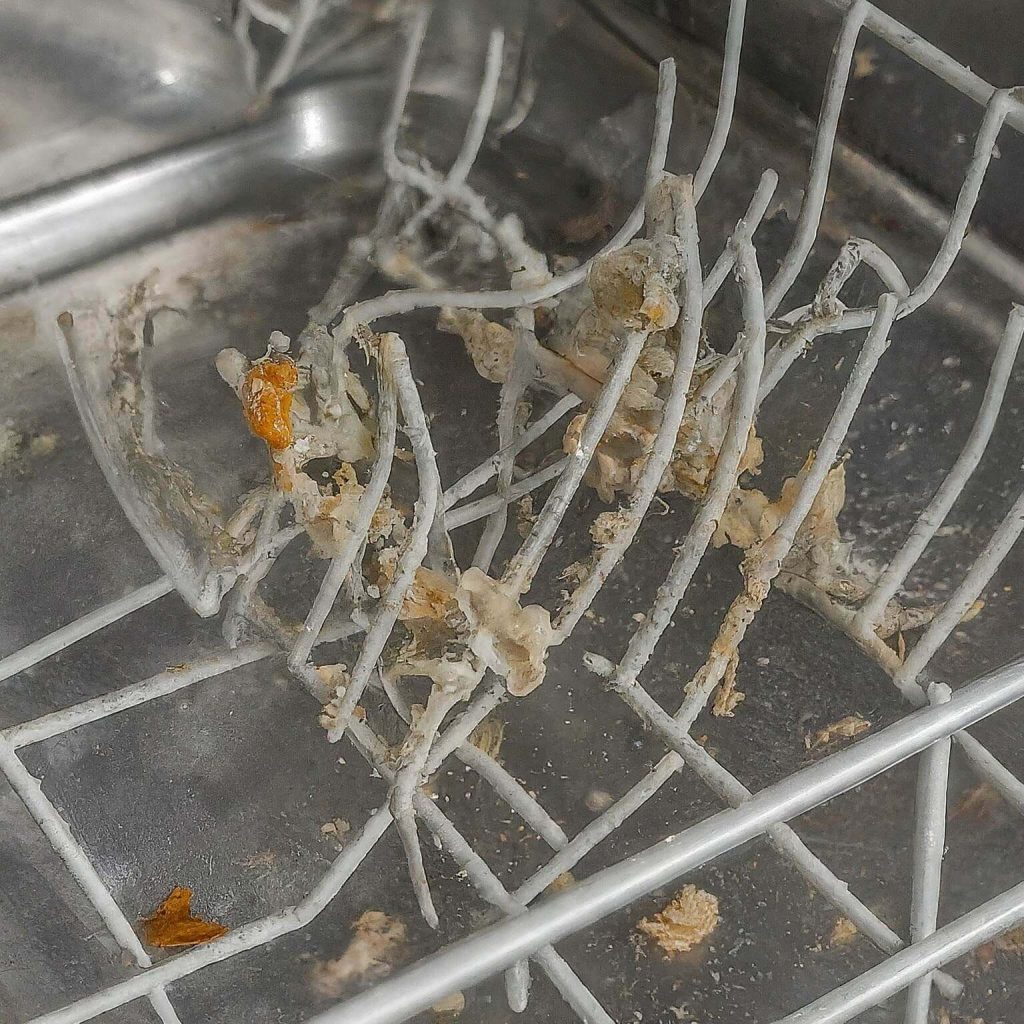
- Cause: Leaving dirty dishes in the dishwasher for extended periods can lead to food spoilage and the growth of bacteria, resulting in unpleasant odors.
- Impact: Food decomposition releases foul odors that can linger within the dishwasher.
- Solution: Run the dishwasher regularly, even with a light load, to prevent food spoilage and odors. Consider using a “rinse and hold” cycle if you don’t have a full load ready but want to prevent food buildup.
7. Drain Clog
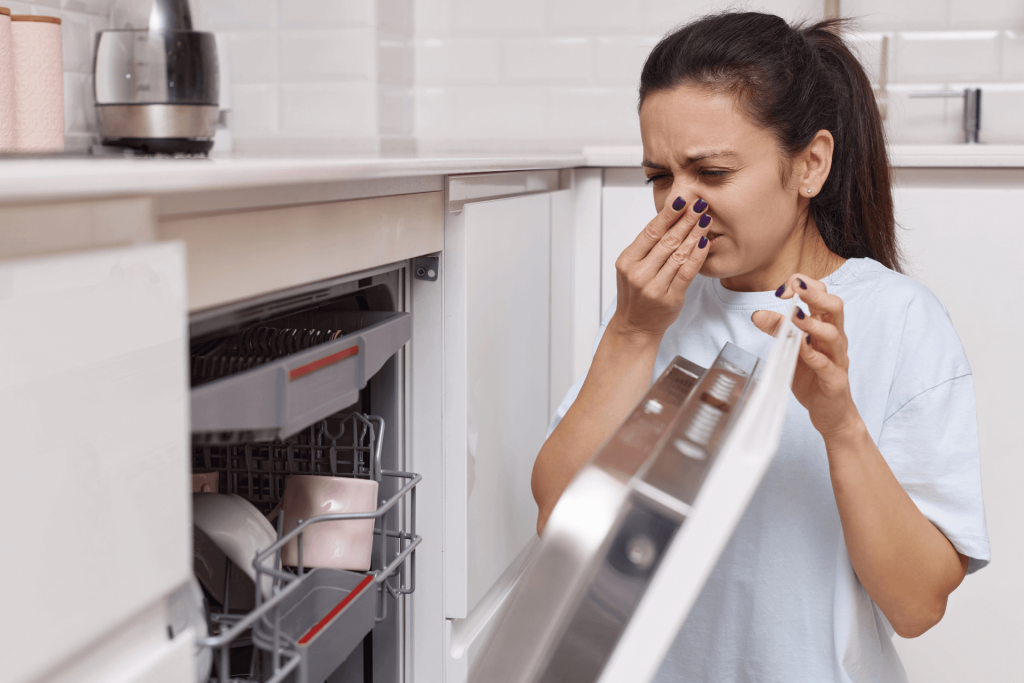
- Cause: Food scraps, grease, and soap scum can accumulate in the drain hose or garbage disposal (if connected), causing drainage issues and odors.
- Impact: A clogged drain prevents dirty water from properly draining out of the dishwasher, leading to standing water, potential mold growth, and unpleasant odors.
- Solution: To minimize drain clogs, scrape or rinse large food particles off dishes regularly before loading them into the dishwasher. If you suspect a clog, attempt to remove it yourself using a drain snake or consult a qualified appliance repair technician for a more thorough cleaning.
- Troubleshooting Tips:
-
- Manual Removal: If the clog is minor, remove it yourself. Consult your dishwasher manual to locate the drain access point (usually at the bottom of the dishwasher). Carefully remove any visible debris and use a plumber’s snake to reach and remove deeper clogs.
- Hot Water Flush: Once you’ve removed any visible debris, pour a pot of hot (not boiling) water down the drain to help loosen any remaining grease or soap scum buildup.
- Baking Soda & Vinegar: This natural cleaning solution can help break down minor clogs. Pour half a cup of baking soda down the drain, followed by a cup of white vinegar. The mixture will fizz. Let it sit for 15-20 minutes, then flush with hot water.
- Commercial Drain Cleaner: If the clog persists, consider using a commercial drain cleaner explicitly formulated for dishwashers. Follow the manufacturer’s instructions carefully, and wear gloves and eye protection when using harsh chemicals.
- Professional Help: If these methods don’t resolve the issue, consult a qualified appliance repair technician for a more thorough cleaning or to address a deeper clog requiring specialized tools or expertise.
8. Hard Water Build-Up
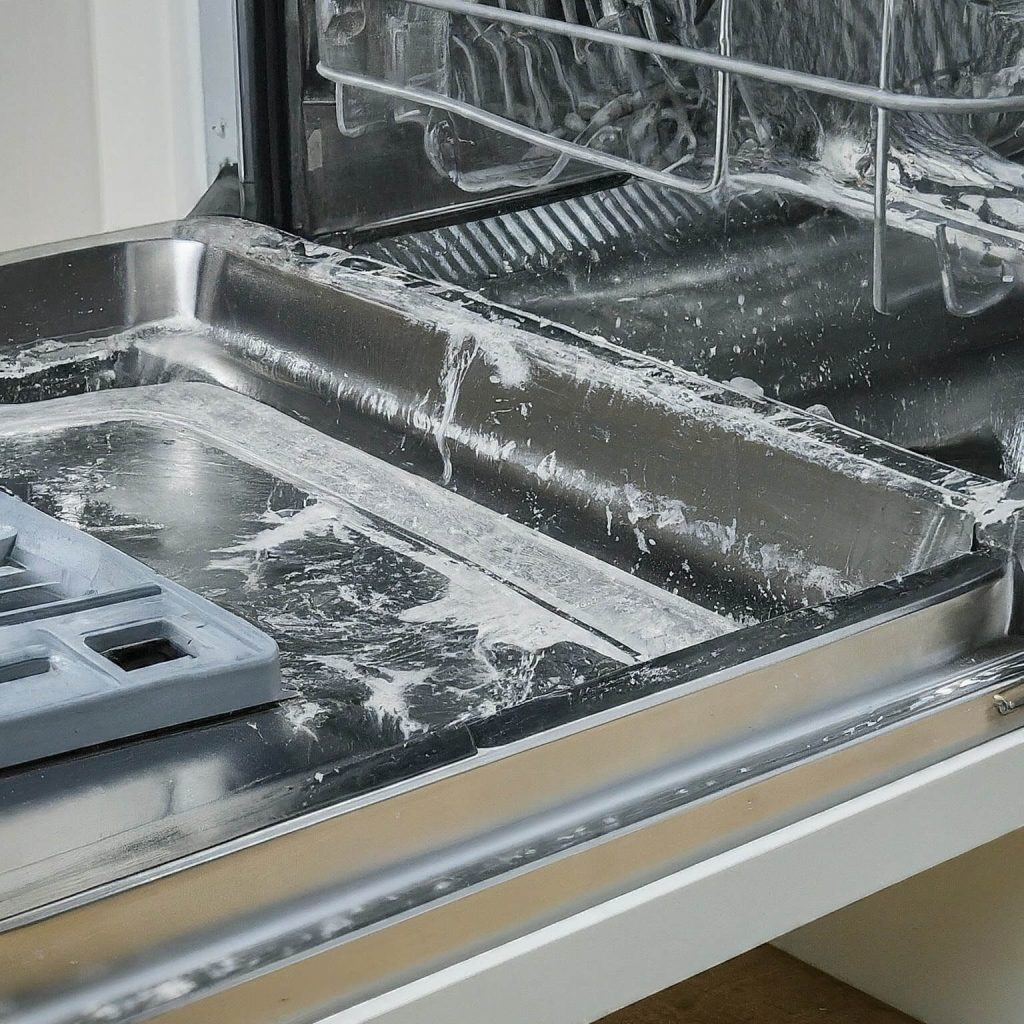
- Cause: Mineral deposits from hard water can accumulate on various dishwasher components, including the spray arms, heating element, and interior walls.
- Impact: Hard water minerals accumulate on components like spray arms and heating elements, reducing water flow and heating efficiency.
- Solution: Use a rinse aid regularly to reduce water spotting and mineral buildup. For long-term prevention, consider installing a water softener for the entire house.
- Troubleshooting Tips:
-
- Dishwasher Cleaner: Run a hot water cycle with a dishwasher cleaner designed to remove grease and hard water deposits. Depending on your water hardness level, repeat this process periodically (once a month or as needed).
- White Vinegar Cycle: Pour 2 cups of white vinegar into an empty dishwasher and run a hot water cycle. Vinegar is a mild acid that can help dissolve mineral deposits. Note: Don’t use vinegar with dishwasher detergent in the same cycle, as they can neutralize each other’s effects.
- Water Softener: If your home has hard water, consider installing a water softener. This will benefit your dishwasher and other water-using appliances, reducing mineral buildup and improving their efficiency.
- Rinse Aid: Using a rinse aid can help prevent hard water spots by allowing water to sheet off dishes easily. Follow the manufacturer’s instructions for proper use and dosage.
General Maintenance Tips For A Long-lasting Dishwasher
Here are some key maintenance tips to ensure your dishwasher continues to keep your dishes sparkling clean:
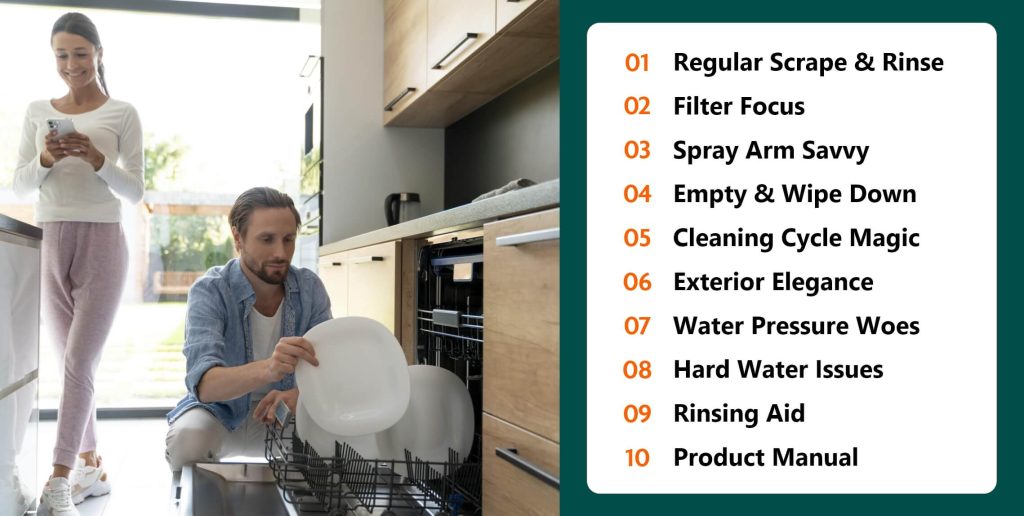
- Regular Scrape & Rinse: Don’t rely solely on your dishwasher to do all the work. Scrape off large food particles and rinse any excess debris from dishes before loading them. This reduces the strain on the filter and prevents clogs.
- Filter Focus: The dishwasher filter is crucial in trapping food scraps and debris. Clean the filter regularly according to the manufacturer’s instructions, typically removing and rinsing it under running water. A clogged filter can hinder water flow and reduce cleaning performance.
- Spray Arm Savvy: The spray arms distribute cleaning water throughout the dishwasher. Regularly inspect them for clogs caused by food particles or mineral buildup. Remove the spray arms if possible and soak them in warm, soapy water to loosen any debris. A gentle brush or toothpick can help clean the tiny spray holes.
- Empty & Wipe Down: Don’t leave dirty dishes in the dishwasher for extended periods. This can lead to food spoilage and unpleasant odors. Empty the dishwasher after each cycle and wipe down the door gasket with a damp cloth to prevent food debris buildup and potential mold growth.
- Cleaning Cycle Magic: Periodically (once a month or as needed) run a hot water cycle with a dishwasher cleaner specifically designed to remove grease and hard water deposits. This helps maintain the dishwasher’s internal cleanliness and prevent the buildup of odors.
- Exterior Elegance: Clean the dishwasher’s exterior with a stainless steel cleaner (if applicable) or a damp cloth to maintain its appearance and prevent dust buildup.
- Water Pressure Woes: Low water pressure can hinder the dishwasher’s cleaning performance. Check your home’s water pressure using a pressure gauge. If it falls below the manufacturer’s recommended level (usually around 40-60 psi), consult a licensed plumber to diagnose and address the issue.
- Hard Water Issues: If you have hard water, consider installing a water softener for your home. This will benefit your dishwasher by reducing mineral buildup and extending the lifespan of other water-using appliances.
- Rinsing Aid: A rinse aid can help prevent water spots on dishes by allowing water to float off more easily. Follow the manufacturer’s instructions for proper use and dosage.
- Product Manual: Your dishwasher’s manual is a treasure trove of information. It contains specific cleaning instructions, maintenance recommendations, and dishwasher troubleshooting tips for your model. Refer to it regularly to ensure you’re caring for your dishwasher correctly.
For optimal cleaning performance, avoid overloading the dishwasher and place dishes strategically to allow proper water flow from the spray arms. Consult your dishwasher manual for recommended racking techniques.
By following these simple yet effective maintenance tips, you can ensure your dishwasher remains a reliable and efficient partner in your kitchen for years to come. Remember, a little care goes a long way in keeping your dishwasher happy and your dishes sparkling clean!
Home Warranties And Dishwashers: A Safety Net for Unexpected Breakdowns
While proper maintenance is key to a long-lasting dishwasher, even the most cared-for appliances can experience unexpected breakdowns. This is where a home warranty can provide valuable protection for your dishwasher and peace of mind for you. Here’s how home warranties can be helpful specifically for dishwashers:
- Coverage for Repairs: Most home warranty plans cover repairs for major dishwasher components in case of malfunction. This could include issues like a faulty spray arm, a broken pump, or a malfunctioning heating element. The warranty typically covers the cost of labor and replacement parts (up to a certain limit) to get your dishwasher back in working order.
- Financial Protection: Dishwasher repairs can be expensive, especially if they involve replacing major components. A home warranty can significantly reduce the financial burden associated with unexpected breakdowns. You’ll typically pay a pre-determined annual or monthly service fee, and the warranty company will cover the repair costs (minus any deductible).
- Qualified Technicians: Many home warranty companies have a network of qualified and licensed appliance repair technicians. When you file a claim, the warranty company will usually arrange for a technician to diagnose and repair your dishwasher, ensuring you get professional service.
- Peace of Mind: Knowing you have a safety net in place for major dishwasher repairs can provide valuable peace of mind. You won’t have to worry about the sudden cost of a major breakdown, allowing you to focus on getting your dishes clean.
Conclusion
In conclusion, keeping your dishwasher happy and healthy doesn't require complicated procedures. By following these simple yet effective maintenance tips, you can ensure your dishwasher remains a reliable and efficient partner in your kitchen for years to come. Regular cleaning routines, including filter care and spray arm inspection, will keep your dishwasher functioning optimally.
related articles
 Discover First American Home Warranty Locations and What You Need to Know About Their Cover.
Discover First American Home Warranty Locations and What You Need to Know About Their Cover.
 Reviews of Home Warranty Companies Show You How to Determine If Your Home Is Covered
Reviews of Home Warranty Companies Show You How to Determine If Your Home Is Covered











